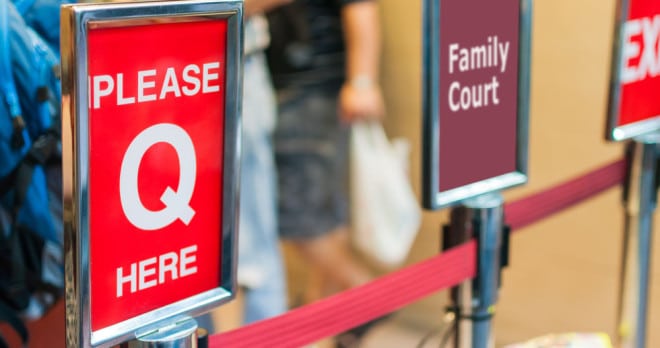Why the divorce courts are clogged up

As many as two thirds of cases now involve at least one side that has no lawyer acting for them. Unfortunately, individuals that are unrepresented don’t have the expertise that lawyers do to run their case effectively, which is leading to delays.
The main reason for this has been the highly publicised legal aid cuts, which has meant that legal aid is now only available to a few individuals, where there has been domestic violence or there are child protections issues.
Alongside the cuts, legal aid for mediation was made more readily available, the Government theorising that more people would use mediation to settle their disputes. In fact, the reverse has happened and fewer couples are accessing mediation, perhaps because they have not had access to the lawyers to point them in that direction.
To counter this changes to the law made in April 2014 make it compulsory for anyone making an application for a Child Arrangements Order or an application relating to finances within divorce to attend a Mediation Information and Assessment Meeting (MIAM). Only certain mediation practices, including Withy King, are authorised to provide this service.
MIAMs and Mediation
The purpose of a MIAM is to assess whether the case is suitable for mediation.
Mediation is a short face-to-face meeting that attempts to negotiate a way of resolving your dispute which need not necessarily be between a separated couple. Although mediation is not always appropriate, e.g. if there has been domestic violence or there are child protection concerns, it does give both parties an opportunity to try and reach an agreement together, often saving costs and avoiding unnecessary delays.
If an agreement is reached, you can then see a lawyer to have the agreement drawn up in to a legally binding document, meaning that court can be avoided altogether, which is probably the more favourable option as it means racking up less legal costs!
If at the MIAM its decided that mediation would not be appropriate the mediator will provide a form that must accompany the application being made to the Court.
As these changes only took place earlier this year time will tell whether it will make any difference to freeing up the Family Courts.
For more information about mediation, collaborative law and other options to settle out of court contact our Family team on ![]() 0800 923 2074 or email [email protected].
0800 923 2074 or email [email protected].